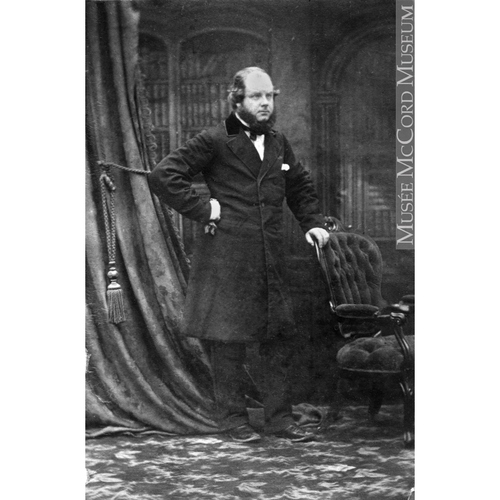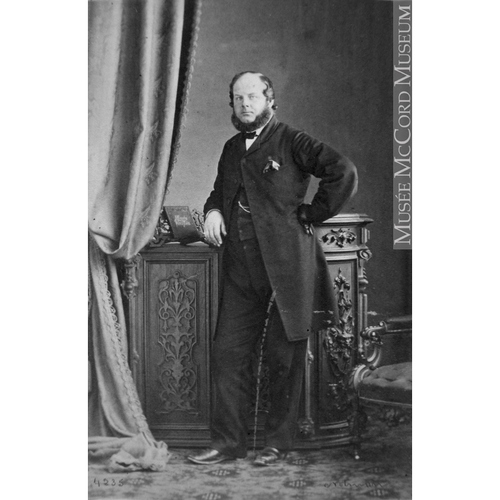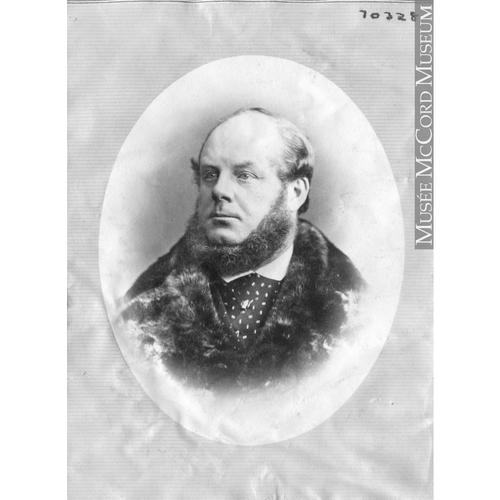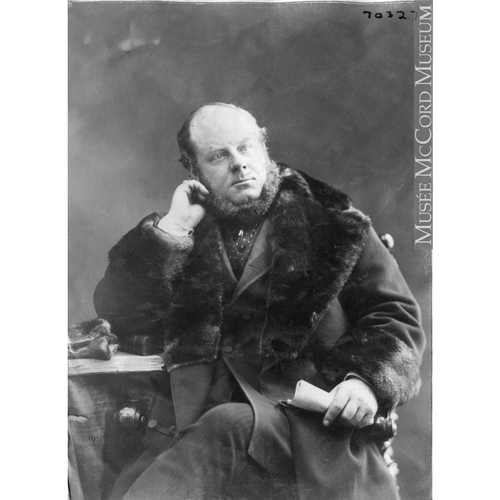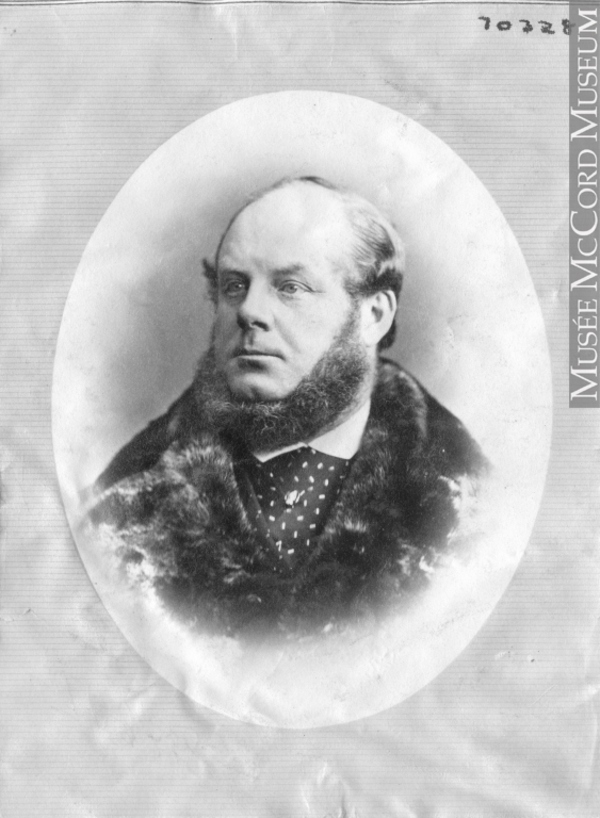
Source: Link
FRY, HENRY, ship-broker, shipowner, reformer, office holder, and writer; b. 5 June 1826 in Bristol, England, eldest of ten children of George Fry, a butcher, and Charlotte Augusta Goss; m. 9 Dec. 1858 Mary Jane Dawson in Montreal, and they had one daughter and six sons; d. 27 Feb. 1896 in Sweetsburg, Que.
Henry Fry’s career in the shipping business began at the age of 12, when he entered Mark Whitwill’s brokerage firm in Bristol as an apprentice. By the time he was 19, he was entrusted with chartering its ships in Wales, and a year later he started travelling regularly to London on business. In 1851 he became a partner in the firm. The year 1854 marked his first visit to Quebec, where he represented Whitwill’s during the season and also superintended the salvage and repair of two vessels caught in the ice, receiving a handsome cheque from Lloyd’s of London for his good work. Because of the heavy demand for shipping occasioned by the Crimean War, however, he had difficulty carrying out his instructions to buy one or two vessels, and purchased only a small barque at the top of the market. For this he suffered criticism from his partner on his return, and consequently bought out Whitwill’s share in the ship. The following season he once more represented Whitwill’s in Quebec, but when he returned in 1856, it was on his own account as shipowner, shipping agent, and Lloyd’s agent from Gaspé to Sorel.
Fry already owned or had shares in four vessels, and over the next 30 years he purchased or acquired an interest in another 18, managing them himself. They included the Devonshire of 1860 and the Cosmo of 1877, built by Henry Dinning*, whose work he admired, and the Rock City of 1868, constructed by Henry Warner and Lauchlan McKay, brother of the famous American clipper builder Donald McKay. These vessels were all ordered to provide work for Quebec ship carpenters during particularly hard times. But it was not only the carpenters who needed help. On Dinning’s urging he supported Édouard Trahan, a capable builder who lacked capital, contracting with him for four vessels between 1861 and 1864. He did not, however, make a practice of financing shipbuilders, using his profits, rather, to run a timber-exporting business, which he described as his “hobby.” He spent most winters in Britain furthering his business interests, crossing the Atlantic 37 times in 23 years, and often sailing in January when conditions were at their worst. In 1873 his brother Edward Carey joined him as a partner, and the firm became Henry Fry and Company.
Fry played an active part in the business community in many capacities. He was a director of the Quebec Bank from 1864 to 1878, president of the board of trade from 1868 to 1871, and vice-president of the Dominion Board of Trade in 1872 and president in 1873. He sat on the board of the Quebec Harbour Commission, ex officio from 1866 to 1868 and as one of two elected members representing the “shipping interests” from 1875 to 1879.
He was well known in shipping circles on either side of the Atlantic both for his courageous stand against crimping and for his successful struggle for the re-introduction of legislation to forbid deck-loads in winter and to set regulations for handling bulk grain shipments. Current practices, he maintained, were responsible for the loss of many lives. Throughout his years as a shipowner only four men were lost in vessels under his management, and he attributed this excellent record to the fact that they carried no deck-loads after 1 October. His knowledge and good judgement of maritime matters were such that he frequently served as assessor for the Vice-Admiralty Court of the city of Quebec. It is not surprising that Basil Greenhill, former director of the National Maritime Museum in London, describes him as “an outstanding figure in the maritime history of Canada.”
The same social conscience that Fry showed in business led to his active participation in community affairs, which he recorded in his memoirs. He was a trustee of the Quebec High School from 1866 to 1877, and a Protestant commissioner on the Council of Public Instruction in 1876–77. In 1865 he became an advisory councillor for the Ladies’ Protestant Home, serving on the council until 1877. Made president of the Young Men’s Christian Association in 1870, he held the position for eight years; he also served on the committee of the Young Women’s Christian Association in 1875–77. In addition he was on the committee of the Evangelical Alliance from 1873 to 1877, on the committee and then vice-president of the Bible Society from 1857 to 1878, and a commissioner of the Religious Tract Society from 1857 to 1877. Appointed treasurer of the Literary and Historical Society of Quebec in 1867, he remained a member of the council until 1872. He was also treasurer of Baptist Church from 1875 to 1877 and of the Quebec City Mission from 1870 to 1877.
Fry used his pen to dual purpose. His “Reminiscences,” which he wrote for his son Henry in 1891, are illustrated with his own fine drawings of the ships he owned. Later he added “Leaves of my life,” a series of drawings of other vessels mentioned in his memoirs. He wrote a paper for the Dominion Board of Trade on deck-loads and grain cargoes, which was reprinted in the Nautical Magazine in 1873. This was followed by a booklet, Lloyd’s: its origin, history and methods, published in Quebec in 1895, and that same year, an article for the Canadian Magazine, “Shipbuilding in Quebec,” in which he made a plea for government support of metal shipbuilding. He was extremely interested in and an early advocate of the use of steam, and on his visits to Britain was a frequent visitor at shipyards where steamers were under construction. The history of North Atlantic steam navigation with some account of early ships and shipowners, published in London and New York in 1896, the year he died, stands as his own fitting memorial.
[The author wishes to thank Mr John Fry of New York and Mrs Lucy Fry Webster of Truro, N.S., for access to documents in their possession, in particular the “Reminiscences” of Henry Fry. Fry was a prolific writer, especially during his retirement, and many of his writings have never been printed. His published works include Atlantic steam navigation (Quebec and Bristol, Eng., 1883) and A biographical sketch of Sir N. F. Belleau from “Home Journal,” for October 1894 (Quebec, 1894). e.m.]
ANQ-M, CE1-109, 9 déc. 1858. ANQ-Q, CN1-51, 29 avril 1873; F2. Literary and Hist. Soc. Arch. (Quebec), L1, B. NA, RG 42, E1, 1293–402. Gazette (Montreal), 28 Feb. 1896. Judith Fingard, Jack in port: sailortowns of eastern Canada (Toronto, 1982), 207. Basil Greenhill and Ann Giffard, Westcountrymen in Prince Edward’s Isle: a fragment of the great migration (Newton Abbot, Eng., and [Toronto], 1967; repr. Toronto and Buffalo, N.Y., 1975).
Cite This Article
Eileen Marcil, “FRY, HENRY,” in Dictionary of Canadian Biography, vol. 12, University of Toronto/Université Laval, 2003–, accessed January 1, 2026, https://www.biographi.ca/en/bio/fry_henry_12E.html.
The citation above shows the format for footnotes and endnotes according to the Chicago manual of style (16th edition). Information to be used in other citation formats:
| Permalink: | https://www.biographi.ca/en/bio/fry_henry_12E.html |
| Author of Article: | Eileen Marcil |
| Title of Article: | FRY, HENRY |
| Publication Name: | Dictionary of Canadian Biography, vol. 12 |
| Publisher: | University of Toronto/Université Laval |
| Year of publication: | 1990 |
| Year of revision: | 1990 |
| Access Date: | January 1, 2026 |


